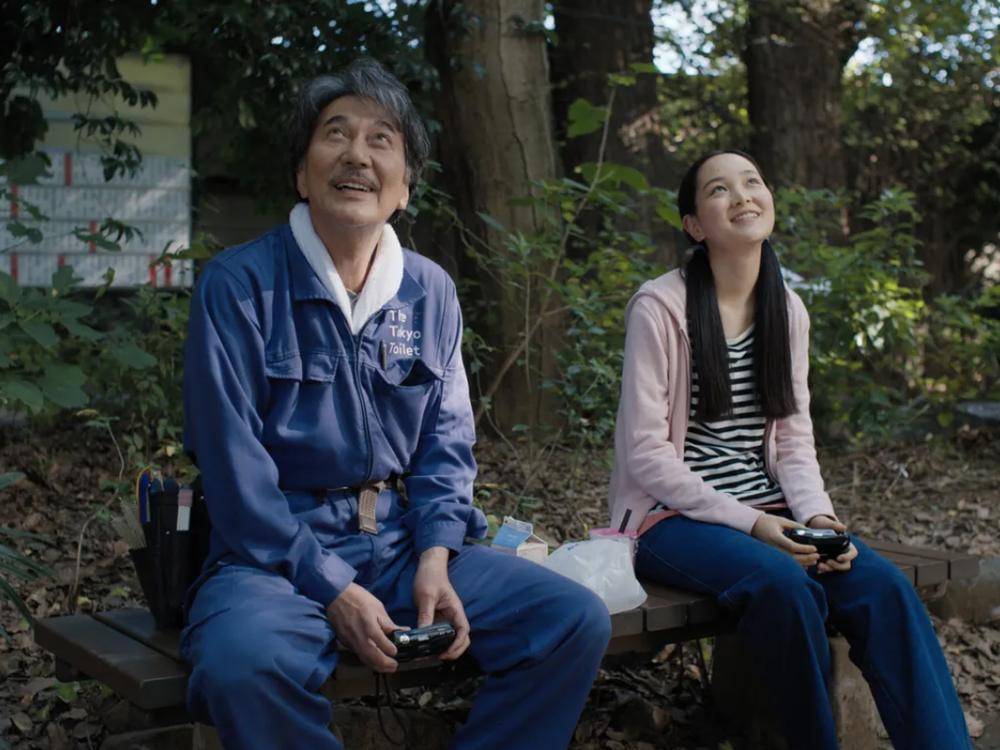Section Branding
Header Content
How to have 'Perfect Days' in a flawed world — this film embraces beauty all around
Primary Content
One of the most famous scenes in Japanese cinema comes in Yasujirō Ozu's classic Tokyo Story. A young woman named Kyôko is grumbling to her radiantly noble sister-in-law Noriko about how badly her siblings have been acting. "Isn't life disappointing?" Kyôko asks, to which Noriko replies calmly, "Yes it is."
Dealing with life's limitations is the theme of Perfect Days, the latest movie by Wim Wenders, the venerable German director for whom Ozu has long been an idol. Shot entirely in Tokyo — in Japanese — this elegant, sentimental fable is Wenders' best fiction feature in decades. Although it flirts with glibness, Perfect Days asks questions about how to live in the face of need, loneliness and disappointment.
It centers on a 50-ish looking bachelor, Hirayama, played by the great Japanese screen actor Kōji Yakusho, whom you will know from Tampopo, Shall We Dance? and Memoirs of a Geisha. Hirayama's life may sound unbearably grim: He works cleaning public toilets in Tokyo. But before we go any farther it's necessary to say that these toilets – all of them real – are spectacular. Some look like spaceships, others like country cottages; the most amazing ones have see through walls that magically go dark when someone steps inside. You'll wish your town had toilets like these.
Anyway, we quickly grasp that Hirayama is not unhappy. He lives a highly ritualized existence whose routine we soon come to know: He wakes up, spritzes his plants, looks with pleasure at the morning sky, buys canned coffee from a nearby vending machine and then drives his van off to work playing old music cassettes by the likes of The Kinks, Patti Smith and Otis Redding, who's still sitting on the dock of the bay. Once he arrives at the toilets, he silently cleans them with the efficiency and care of an artisan – unlike his amiably feckless young colleague, Takashi.
Even as those around him seem lonely or lost, Hirayama takes time to savor life's small beauties: sunlight tickling the trees, children laughing in a park, the invariably friendly greeting at the small luncheonette where he's a regular. He uses an old digital camera to photograph things that move or delight him. All of this is beautifully put across by Wenders, with no small help from cinematographer Franz Lustig's crisp images of Tokyo and the tautly seductive editing of Toni Froschhammer, which draws you into the rhythms of a monkish man who appears to know how to live, as they say, in the moment. As he says, "Now is now."
To be honest, Hirayama's days are a bit too perfect, starting with the fact that this handsome actor looks so good in his blue cleaner's uniform and that the toilets he scrubs are suspiciously unsoiled. By the time we inevitably hear Lou Reed singing "A Perfect Day," you may well wonder if Wenders has sold himself on a Disneyfied vision of zenned out simplicity, one fed by Western clichés about Japaneseness as a path to spiritual grace. I mean, try to imagine believing a story about a beatific toilet cleaner in Berlin – or New York City.
Against this naively sweetened portrait of menial work, Wenders places shadowy images that suggest life's evanescence. And eventually someone does come along to shake up Hirayama's perfect routine, forcing both him and us to reconsider the life he's been leading. I won't give anything away – the movie's too delicate for that – but I will say that it builds to a scene in Hirayama's van that, to the strains of Nina Simone, thrilled me with its rush of shifting emotions and interweaving of light and dark.
This scene is brilliantly performed by Yakusho. Although Hirayama rarely speaks, you see why he won best actor at Cannes. Open faced and watchful, Yakusho couldn't be more touching as a man who has learned to hold himself together amidst imperfect circumstances but to find joy within them.
We twice hear the song "House of the Rising Sun," the old folk tune lamenting a life ruined by time spent in a house of ill repute. Yet the movie itself is no lament. Wenders once dreamed of being a priest, and here he nudges us toward transcendence. Constantly showing us daybreak over Tokyo, he reminds us that the true house of the rising sun is the world. But rather than bemoan the ways that the world is dark and disappointing, the film suggests that we find and appreciate the transient beauty around us. This may not make our days perfect, but it will make them better.
Bottom Content




